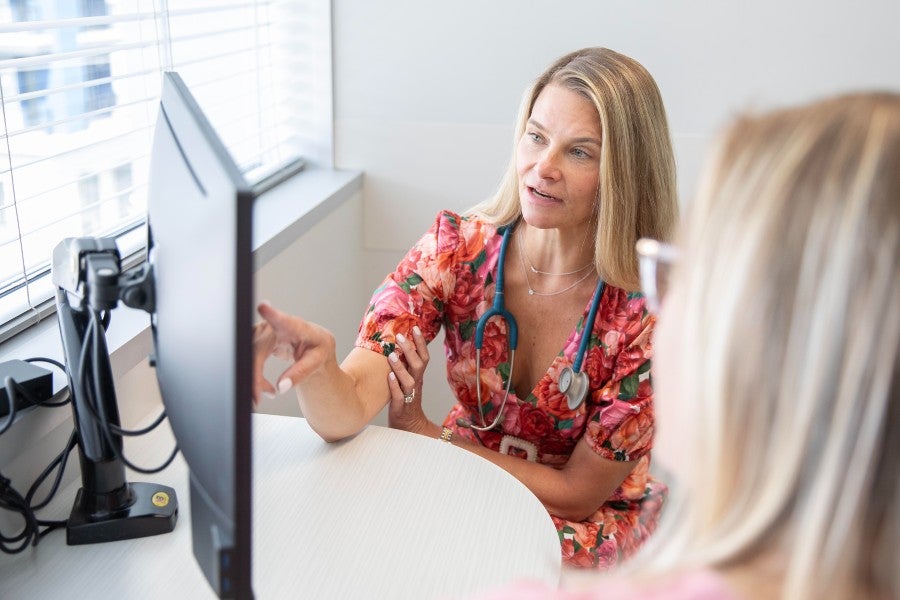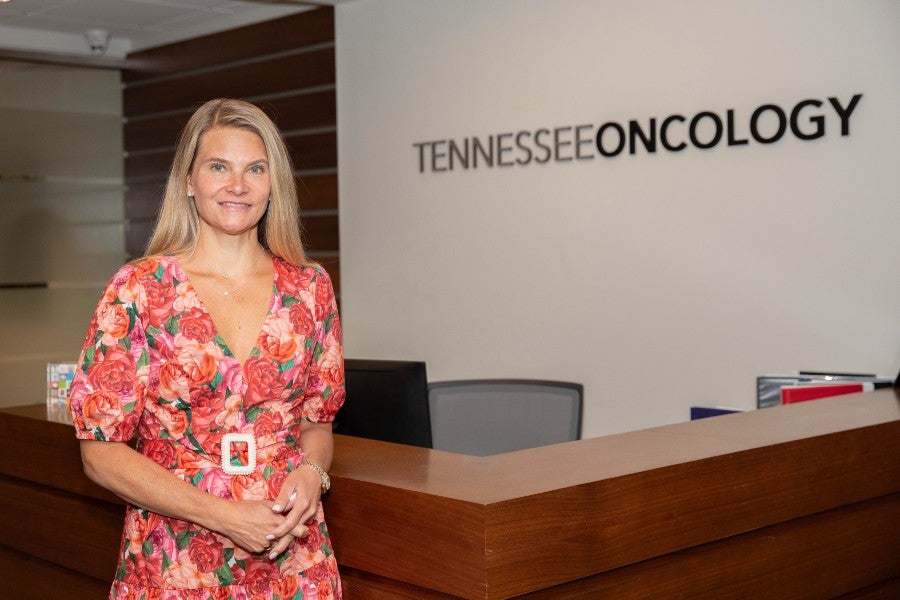Finding new hope every day
Alumna Johnetta Blakely has hope for her patients, hope for curing cancer and hope for women working in the health care industry.
By Janel Shoun-Smith | 615-966-7078 |

Where others may see despair, Johnetta Blakely (BA ’94) sees hope. And she still sees hope every day even 20 years after taking up her calling to treat cancer patients in Tennessee.
“I don’t know of another place where I could have Jesus sitting next to me all day,” said Blakely, a Nashville oncologist, speaking both metaphorically and literally. She has a small Jesus figurine bobbling on a spring on her desk at Tennessee Oncology. But for her, it is more than a cute knick-knack, she said.
“I don’t know how I tell patients the things I have to tell them, but the words always come to me, and I think that is because of Jesus,” said Blakely, who sees about 15 new patients each week dealing with a cancer diagnosis.

Blakely discovered her calling through her experiences volunteering to work with cancer patients at Vanderbilt University Medical Center during her days at Lipscomb and in medical school at the University of Tennessee at Memphis. Throughout her work, she saw the same people over and over again. As she saw hope in the patients, she realized she was enjoying the work she had initially thought would be depressing.
Later in medical school, she worked with Dr. Lee Schwartzberg at Memphis’ The West Clinic, a world-class center of excellence for oncology, hematology, radiology and other advanced medical care in West Tennessee, and that experience solidified her path to become an oncologist. Just five years after graduating from Lipscomb, she was one of the leading clinical researchers at The West Clinic, where she focused on treating sarcoma (tumors of the bone and muscles) in adults.
“If you look back just five years, we have come a long way in cancer research and treatment, but there are still many days when I cry with my patients,” she said in 2009, during her time at The West Clinic, treating patients and working to develop and execute clinical trials with other researchers across the nation.
“This is not a job for everybody, but the Lord leads us each to what we are supposed to be doing,” she continued. “I experience hope with the people I work with. I get to celebrate with many of my patients.”
Today, Blakely continues to work with patients as a medical oncologist for Tennessee Oncology, seeing patients in both Nashville and Cookeville, a clinic she established for Tennessee Oncology less than two years ago.

Blakely is the executive vice president of quality and clinic operations at Tennessee Oncology and also treats patients in Nashville and Cookeville.
Tennessee Oncology is the largest private practice oncology group in Tennessee, caring for more than 85% of the cancer patients in the Nashville area and more than 50% of the patients across the state. In 2011, she and her family moved back to Nashville and Blakely joined the practice, which provides cutting edge care to patients where they live statewide and provides a comprehensive approach to care including services such as palliative care, psychology, financial counseling, radiation oncology, nutrition, pharmacy and more.
Blakely worked as an oncologist in Nashville, Clarksville and Springfield before becoming the executive vice president of quality and clinic operations at Tennessee Oncology and opening the Cookeville clinic, established due to community need. She works mostly with breast and lung cancer, but in the more rural area of Cookeville, she is seeing patients with all types of cancer.
Local providers told the practice that some patients in the Cookeville area were waiting up to six weeks to be seen locally prior to the Tennessee Oncology clinic, Blakely said. For some patients coming from low-resource areas, she provides the initial diagnosis, so they don’t have to travel as far to get quicker answers. She sees an outpouring of gratitude from patients who appreciate her providing such crucial care locally.
“I work hard there, but when I drive home that night I feel like I have done something good that day,” she said, especially because not everyone is willing to make the drive to provide care in the areas where it is most needed.
“For someone in a leadership position, it is important to see what it is like in a single doctor clinic and the challenges it brings,” she said.
The opportunity to be a leader came because of the open and inspiring culture at Tennessee Oncology, which has several women at the executive level, said Blakley. While working there she was inspired six years ago to pursue a master’s degree in business, which she uses in her current role overseeing clinic operations, improving systems and ensuring quality.

Ward Fellow Leah Jacob
As a woman in the health care industry, Blakely has a passion for nurturing female health care providers and leaders.
She has volunteered to mentor a Lipscomb science student through the J.S. Ward Society, an alumni affinity group for those interested in promoting the health sciences to the next generation. She specifically invited her mentee, Leah Jacob, a biochemistry and molecular biology major, to an event highlighting issues concerning women in oncology.
“It bothers me that women seem to think that if they have a family, they can’t be a doctor,” said Blakely. “It’s just not true.”
Blakely has two grown daughters and a spouse, Martin Blakely, who is also a doctor, a pediatric surgeon at Vanderbilt University Medical Center.
Both of her daughters consider their family unit to be “tight-knit,” and both are highly independent, world-savvy individuals due to their upbringing, said Blakely. The three of them would sit at the table and do homework together while Blakely was pursuing her master’s in health management.
Blakely knows working women face hard choices; she herself set aside research in place of strictly seeing patients when moving back to Nashville for the benefit of her family, but “it’s a misconception that if a woman works, she will completely miss the life of her child,” she said.